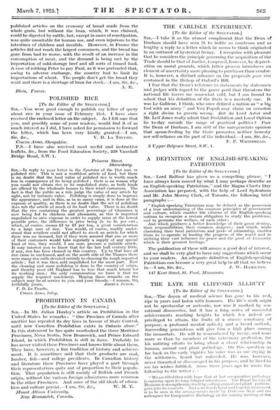POLISHED RICE [To the Editor of the SPECTATOR.] ,SIR,ŌĆöYou were
good enough to publish my letter of query about rice in your issue of February 21st. I have since received the enclosed letter on the subject. As I felt sure that you, and possibly some of your readers, would find it of as much interest as I did, I have asked for permission to forward the letter, which has been very kindly granted.ŌĆöI am, Sir, &c., V. D. LA TOUCHE. Craren, Arms, Shropshire.
P.S.ŌĆöI have also received most useful and instructive leaflets, &c., from the Food Education Society, 329 Vauxhall Bridge Road, S.W. 1.
Princess Street, Shrewsbuny.
SIR,ŌĆöIn reply to your letter in the Spectator of the 21st inst. re polished rice. This is not a worthless article of food, but there is no doubt that the food value of polished rice is worth much less in consequence of its being polished ; there is no reason why you could not obtain rice in its unpolished state, as both kinds are offered by the wholesale houses to their retail customers. The fact is that the public as a rule judge the value of any article by sight, not by intrinsic value. Polishing is simply done to improve the appearance, and in this, as in so many cases, it is done at the expense of quality, as there is no doubt that the act of polishing does rob the article of much of its food value. There is no doubt that the rice containing the greatest percentage of vitamins is now being fed to chickens and pheasants, as this is imported unpolished to save expense in order to supply same at the lowest possible price, the difference in price being 2s. to 3s. per cwt., which, of course, means ┬Ż2 to ┬Ż3 per ton, a great consideration to a largo user of rice. You would, of course, readily under- stand that retailers could not afford to stock an article for which there was no demand, but if they- were assured that one or more of their customers would take regularly a supply of any special kind of rice, they would, I am sure, procure a suitable article. It may interest you to know that for the last half century little, if any, rice has been cleaned in this country. Up to that time all rice came in uncleaned, and on the south side of the Thames there were many rice mills devoted entirely to cleaning the rough imported article ; but it was then sold unpolished for the most part. Now the cleaning and some polishing is done in the country of origin, and thereby poor old England has to lose that much labour for its working men ; the only compensation we have is that we supply the required machinery. Hoping these remarks on the subject may be of service to you and your friends.ŌĆöI remain, Sir,


























































 Previous page
Previous page